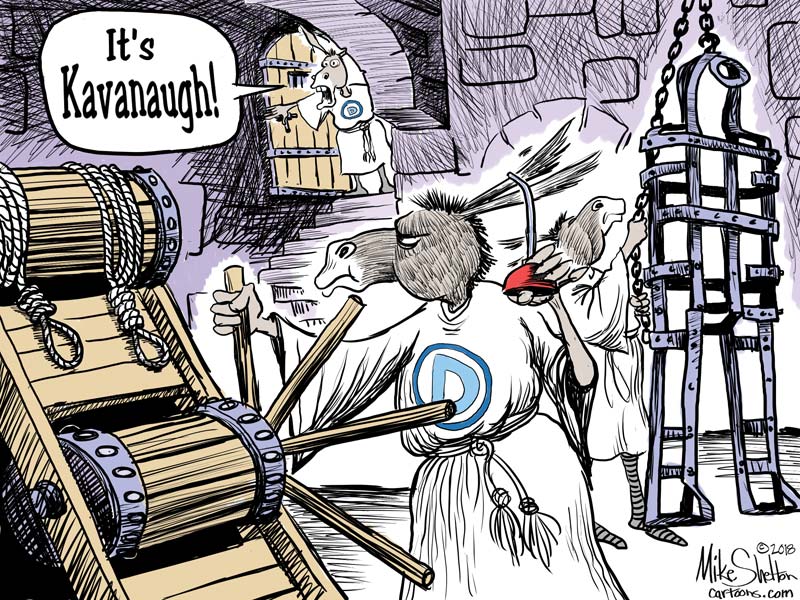
Now that the justices and their families need permanent, professional and close security, as they unquestionably do, there will be no going back. The court building at One First St. NE will continue its transformation into a garrisoned fortress, not the marble palace of the people's justice it was built to be.
The individual and collective isolation of the justices will be deepened, distancing them further from the currents of ordinary life. Increasingly, they will lose their identities as normal people, disappearing into their symbolic roles. Their lives are changed irrevocably.
This now inevitable development isn't just bad for the justices. It's bad for democracy. And it's terrible for the rule of law, which benefits when the justices can do their jobs with a minimum of spillover into their personal lives.
For more than 200 years, the justices have mostly lived charmed lives, at least from the standpoint of high government officials. From John Marshall through Thurgood Marshall and up to the present day, there has been only one recorded attempt to kill a justice, in 1889 (Justice Stephen Johnson Field's bodyguard, a U.S. marshal, killed the assailant). Someone shot a bullet through Justice Harry Blackmun's apartment window in 1985, but police determined that the incident was probably random.
Except for some exceptionally tumultuous periods, the justices' names were hardly known: As recently as 2018, more than half of Americans couldn't name a single one of the nine members. Their faces were close to anonymous. In Washington DC in the late 1990s, I witnessed the greeter at the Capital Grille - a restaurant five minutes from the court - ask Justice David Souter if he was "with the Souter party" that had made a reservation ("I suppose I am," he replied modestly and wryly).
Why has that changed now?
One reason can't be ignored. The man outside Kavanaugh's home who was charged with attempted murder was, among other things, reportedly incensed about the Supreme Court's impending reversal of Roe v. Wade and with it the federal right to abortion. Just as resistance to Roe engendered murderous attacks on abortion doctors and clinics over the decades, its reversal might inflame passions to an extent we can't yet anticipate and make some people crazy. We do know that the court hasn't rolled back basic individual liberties like this ever in its history. The crumbling of the institutional norms - exemplified by the leak of Justice Samuel Alito's draft majority opinion - flows directly from the radicalism of what's apparently coming.
Of course, the justices should be able to make decisions - even ones that are terribly wrong - without their lives being threatened. Liberals who believe in the rule of law will not play down those threats. The liberal justices are going to need protection just as much as the conservatives. Soon-to-be Justice Ketanji Brown Jackson will be as much in jeopardy as Justice Amy Coney Barrett.
Conservatives and liberals alike should be able to agree that the changes in the justices' way of doing business is the proximate cause of the heightened rage at the court - even as they argue about who is to blame. Opponents of Roe bemoan the disrespect for the institution coming from liberals and, in the case of Justice Kavanaugh, point to the emotionally charged demonstrations that targeted him during his confirmation hearings.
For their part, supporters of Roe accuse the conservative justices of breaking the court's norms as one of the triggers. They cite the storming of the US Capitol on Jan. 6, 2021, as a precedent for political violence that conservative politicians have soft-pedaled and condoned, and also note that radical anti-abortionists have been the ones to use weapons. Both sides have a point.
National craziness has consequences in a highly polarized country in which the Capitol can be stormed and would-be shooters can't be tracked, let alone disarmed, because of the limits of existing gun regulations.
In 2021, more than 4,500 threats and other inappropriate communications were directed at federal judges, according to the head of the U.S. Marshals Service. In 2020, a gunman with a grudge attacked the home of federal judge Esther Salas in New Jersey, killing her son and seriously injuring her husband. Just last week in Wisconsin, a gunman with several politicians on his target list killed a retired judge who had sentenced him years earlier.
Gone are the days when Supreme Court justices avoided the negativity that most public officials must sometimes confront - when they could walk the streets alone or with their families without attracting attention, positive or negative.
That luxury - innocence, if you will - served the country. It lowered the temperature for even the court's high-profile rulings. Today's feverish atmosphere is unusual. But the consequences for how the justices live will be permanent.
(COMMENT, BELOW)
Noah Feldman, a Bloomberg View columnist, is a professor of constitutional and international law at Harvard University and the author of six books, most recently "Cool War: The Future of Global Competition."


 Contact The Editor
Contact The Editor
 Articles By This Author
Articles By This Author